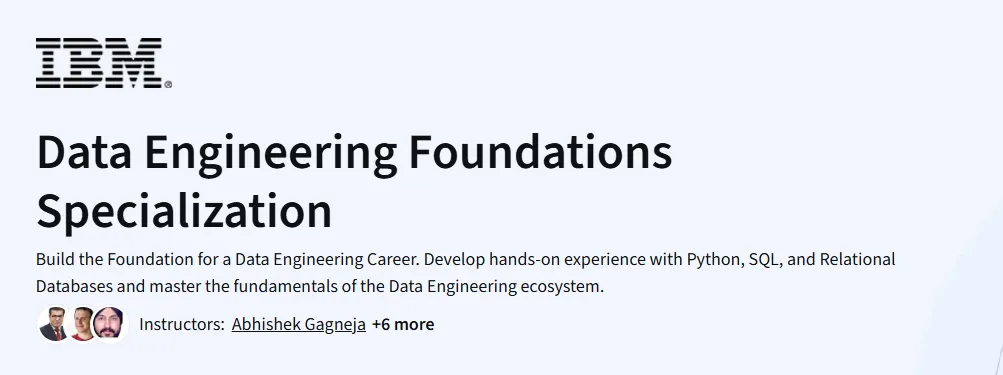What will you learn in Data Engineering Foundations Specialization Course
Core principles of data engineering and its role in data-driven organizations.
How to work with relational and non-relational databases.
Skills to manage big data and use ETL tools.
Basics of cloud platforms and distributed computing.
Data pipelines, warehouses, lakes, and business intelligence systems.
Program Overview
1. Introduction to Data Engineering
⏱️ 1 week
Topics: Data engineer roles, data lifecycle, architecture basics.
Hands-on: Case studies and cloud-based tools overview.
2. Introduction to Relational Databases (RDBMS)
⏱️ 2 weeks
Topics: SQL basics, ER diagrams, normalization, indexes.
Hands-on: Writing SQL queries, building and querying tables.
3. Introduction to NoSQL Databases
⏱️ 2 weeks
Topics: Document, key-value, column, and graph databases.
Hands-on: Working with MongoDB and JSON-based data structures.
4. ETL and Data Pipelines with Shell, Airflow, and Kafka
⏱️ 3 weeks
Topics: Data ingestion, transformation, scheduling, stream processing.
Hands-on: Create pipelines using Apache Airflow and Kafka simulations.
Get certificate
Job Outlook
High Demand: Data engineering roles are rapidly growing with cloud and big data adoption.
Career Opportunities: Data Engineer, ETL Developer, Data Architect.
Salary Potential: $80,000–$150,000/year depending on location and experience.
Freelance Scope: Strong potential for freelance/contract-based data integration and pipeline projects.
Specification: Data Engineering Foundations Specialization
|
FAQs
- No advanced coding is required.
- Basic SQL familiarity helps but is not mandatory.
- Programming concepts are introduced step by step.
- Exercises use beginner-friendly tools.
- Great for those new to both coding and data.
- It covers foundational concepts first (SQL, NoSQL, ETL).
- Introduces distributed systems and cloud basics.
- IBM and open-source tools prepare you for cloud adaptation.
- Cloud-specific depth (AWS/Azure) isn’t included.
- Acts as a springboard for advanced cloud data courses.
- Writing SQL queries to manage relational data.
- Handling NoSQL data in MongoDB.
- Building ETL pipelines with Airflow and Kafka.
- Simulating data ingestion and transformation tasks.
- Structuring data for warehouses and analytics.
- Data engineering focuses on data pipelines, storage, and flow.
- Data science emphasizes analysis, statistics, and modeling.
- Engineers prepare reliable data; scientists interpret it.
- This course trains you to “build the plumbing” for data.
- Both careers complement but follow different skill paths.
- Junior Data Engineer (ETL pipelines, SQL, NoSQL).
- Database Developer or Administrator.
- ETL Developer in enterprise data projects.
- Cloud Data Technician with additional training.
- Pathway to Data Architect with experience.





